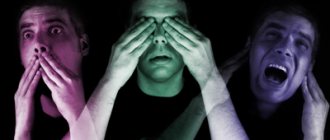- home
- Helpful information
- Mental illness
- Psychoses in old age
Psychosis is a disorder of mental activity and behavior. In old age, this condition is manifested by a whole group of disorders: from hallucinosis to various variants of delusional disorders. Psychosis is dangerous; without treatment and correction, it progresses quickly and can provoke or accompany dementia.
Sign up for a consultation
Causes of senile psychosis
Negative changes in mental state and behavior are associated with the influence of a number of factors:
- neurodegenerative processes: gradual damage, destruction of neurons and connections between them, due to which the functioning of the nervous system and brain deteriorates;
- somatic diseases: deterioration of hearing and vision (complicate communication, provoke illusions, hallucinosis, worsen emotional state), pain syndrome, chronic diseases that worsen general well-being, reduce the quality of life;
- lifestyle: low amount of physical activity, unbalanced diet, disruption of sleep and rest patterns, alcohol abuse;
- social maladjustment: insufficient amount of communication, lack of interests, regular activities, contacts with other people, loneliness, forced isolation;
- genetic predisposition.
You have questions?
We will call you back within 30 seconds
or call the number
Clicking the "Submit"
, you automatically consent to the processing of your personal data and accept the terms of the User Agreement.
Types and symptoms of senile psychosis
Depending on the location and extent of the atrophied areas of the brain, the disease occurs in the form of senile dementia, Alzheimer's or Pick's disease, as well as in the form of delusional, hallucinatory disorders or psychosis of impaired consciousness. There are acute and chronic phases. The sooner drug treatment is started, the lower the risk of the disease progressing to general dementia.
Typical signs of psychosis in the elderly include:
1. Foggy consciousness – inability to recognize people, orientate in time and space. 2. Severe fatigue from minimal exertion. 3. Delirium and attacks of hallucinations. 4. Deterioration of memory, attentiveness, concentration and other cognitive functions. 5. Increased motor excitement. 6. Progression of symptoms of somatic disorders. 7. Changing eating habits. 8. Difficulty falling asleep, nightmares. 9. Panic attacks, paranoia 10. Inability to take care of oneself, indifference to appearance and health. 11. Subdepressive manifestations - reluctance to live, apathy, adynamia, a feeling of spiritual emptiness.
Forms of senile psychosis
Spicy. Mental disturbances in acute psychosis often occur against the background of somatic diseases. They may be associated with poor health, pain, problems with hearing or vision, or a lack of certain vitamins and microelements. Behavior changes sharply, exacerbation can occur with continuous symptoms or with periodic improvements in the condition, short periods of “clearance”. The state of acute senile psychosis usually lasts for about four weeks. It may be preceded by a prodromal period, during which the first symptoms of disorders appear. Before the onset of acute psychosis, consciousness may become confused, the person begins to be bothered by visual or auditory deceptions, and then hallucinations appear. The patient may become apathetic and may feel weak. Problems arise with self-maintenance of hygiene.
When the disease becomes acute, symptoms appear:
- problems with concentration: it becomes difficult to concentrate on some task or conversation;
- difficulties in orientation in space and time;
- problems with personal hygiene, maintaining order in the house;
- loss of strength, fatigue, weakness, apathy;
- high level of anxiety - up to the appearance of strong fears;
- sleep disorders;
- deterioration of appetite up to complete refusal to eat;
- the person feels helpless and confused;
- thinking becomes confused, the person becomes restless;
- movements become chaotic, tremors of the limbs, a feeling of awkwardness, problems with fine motor skills may appear;
- delirium or paranoia may appear (the patient is afraid that they want to harm him, take away his property, rob him).
In the acute form of senile psychosis, the somatic diseases that provoke it can be more severe: the symptoms become more pronounced.
Chronic. In the chronic form of senile psychosis, the emotional state of an elderly person is stably depressed. With a mild course of the disease, it manifests itself as depression. If the patient's condition worsens, more serious disorders are possible: delirium, depression, severe anxiety, excitability. In the chronic form of senile psychosis, mental disorders develop gradually and increase slowly: so that up to a certain point, the disease can be confused with character traits, with the manifestation of negative personality traits. This condition is more common in women; without treatment, it can persist for up to 13-18 years, turning into severe depression, provoking dementia.
Chronic psychosis in elderly patients is manifested by symptoms:
- depression, apathy, reluctance to do something, a feeling of uselessness, meaninglessness;
- mild to moderate depression (progresses without treatment);
- increasing self-recrimination without attempts to change the situation;
- suspiciousness and anxiety increasing over time. In a “provoking” situation that is threatening in the patient’s opinion, strong fears and excitement appear against their background;
- the perception of reality becomes distorted, delusions appear, which can turn into delusional states;
- the character gradually changes, negative traits appear brighter and stronger;
- the quality of sleep deteriorates, persistent insomnia appears;
- impairments of cognitive functions appear: memorizing new information, learning becomes difficult, problems with communication, concentration, and orientation in space and time may arise.
Delirium in the elderly: definition, types and symptoms
Senile delirium is one of the symptoms of involutional paranoia. Involution (from the Latin involution - coagulation) in psychiatry is the process of simplifying certain brain functions, or, in other words, reverse development. Involutional paranoia occurs between the ages of 45 and 60 and without proper treatment can develop into more acute conditions.
Delusion is a persistent, unshakable belief in something that is not amenable to logical arguments and counterarguments. Manifestation of delusions of damage in the elderly - relatives allegedly spoil their things, scratch furniture, etc. As a rule, it occurs without external suggestion and is the result of accumulated life experience, upbringing, education and a combination of other factors.
The disease has two forms: delusional and hallucinatory.
In the first case, the illness is characterized by moderate delusions of persecution or harm from close relatives. Neighbors and other people around, as a rule, do not fall into the circle of suspicion of the patient. This form occurs within one location: an apartment, house or room and does not go beyond its boundaries.
Main symptoms:
- the main culprits are relatives or close acquaintances;
- the scene of action is your own apartment or room;
- the main complaint is the desire of others to break into the house or room;
- The motivation of the “enemies” is the desire to take possession of the patient’s property.
Delusions of an elderly person of the hallucinatory form are characterized by the appearance of auditory, tactile and olfactory hallucinations. The patient begins to feel that his neighbors want to poison him with gas or harm his health in some other way.
Main symptoms:
- hallucinations (tactile, auditory and olfactory);
- idea of persecution;
- the scene of action is transferred to the neighbors' apartments;
- an attempt to carefully inspect the neighbor's home.
Associated disorders in senile psychosis
Against the background of age-related changes in the psyche during the formation of psychotic disorders in elderly patients, the following disorders may appear.
Paranoid delusions. They are manifested by an increase in anxiety, an increase in mistrust, the person is convinced that they want to harm him, rob him, or drive him out of his apartment. The patient may lock himself in his room, aggressively refuse contact with relatives, doctor’s consultations and treatment.
Hallucinosis. Accompanies senile psychosis and often appears against the background of decreased hearing and vision. It seems to a person that he sees or hears something that does not exist in reality. Symptoms increase gradually: at first the patient can see unclear shadows, hear rustling noises, after which the illusions become more and more realistic, and the person loses criticism in their perception. Hallucinosis can be tactile. It manifests itself as burning, itching, and the feeling that insects are crawling on the skin.
Confabulation. Emergence of false memories: the patient is convinced that fictitious events actually happened. He begins to confuse reality and fantasy, his past is distorted, he may believe that he knows influential people or has committed actions that in reality did not happen.
What causes senile psychosis?
Most often, mental disorder occurs in people with an unfavorable family history. If relatives have had manifestations of senile psychosis, the likelihood of getting sick increases by a third. The following may increase the likelihood of developing symptoms:
• experienced strokes and heart attacks; • mechanical damage to the head and cervical spine; • advanced cerebral atherosclerosis; • pathologies of the cardiovascular and endocrine systems; • stress and emotional overload, including the loss of a loved one or change of place of residence; • malignant and benign neoplasms in the central nervous system; • chronic alcoholism, drug addiction and long-term use of sleeping pills; • acute inflammatory processes and aggravated systemic illnesses.
Treatment of senile psychosis
Doctors treat senile psychosis using drug therapy, psychotherapy, general wellness programs, restoration of cognitive functions and a normal emotional state. Treatment begins with diagnosis: it is important to determine the stage and form of senile psychosis, the presence of concomitant diseases, and the severity of the condition. After this, the doctor selects a treatment program. It can be aimed at gradual, step-by-step correction or at eliminating symptoms in an acute form of psychosis. At the Panacea clinic, it is possible to treat senile psychosis in a hospital setting or call a psychiatrist or psychotherapist at home.
Order a visit from a gerontologist. Experienced doctors. Treatment in a hospital or at home. 24-hour service in Moscow and the region. Professional, anonymous, safe.
- Online consultations about dementia
- Factors that provoke dementia
- Dementia with Lewy bodies
- Psychoses in old age
- Age-related personality changes
- Treatment of depression in the elderly
- Is it possible to stop senile dementia?
- Treatment of senile dementia
- Dementia treatment
- Symptoms of Alzheimer's disease
- Drug therapy for patients with dementia
- Diagnosis of dementia
- Manifestation of Alzheimer's disease
- Types of dementia
- Parkinson's disease
- Hallucinations and delusions
- Vascular dementia
- Psychodiagnostics of elderly patients
- Treatment options for Parkinson's disease
- Early diagnosis of mental disorders in older people
- Senile aggression: why does it occur, what to do with it?
- Alcoholic dementia
- Mental disorders in old age
- Pick's disease
- Risk factors for dementia
Treatment of senile psychoses is possible at home
To do this, you should invite a psychiatrist to your home, who will clarify the condition and give recommendations on therapy, supervision and care.
In cases of gross behavioral disturbances in the form of aggression, suicidal intentions, confusion with a danger to the life of the patient or others, hospitalization in a specialized hospital will be required. In this case, the patient can be delivered to the clinic independently or call an ambulance or special services for transporting patients to the home.
Hospitalization of patients with senile psychoses is possible both in public psychiatric clinics and in private ones.
Causes of diseases in old age
- Genetic predisposition;
- Atherosclerosis of cerebral vessels, hypertension, hypotension, diabetes mellitus in an advanced stage;
- Abuse of sleeping pills, drops containing alcohol, alcoholic beverages, psychoactive substances;
- A sharp change in the usual way of life;
- Exacerbation of chronic somatic disease or acute inflammation.
- Alzheimer's disease.
- Aging of the body.
During the period of exacerbation of these diseases, signs appear that may be symptoms of the development of psychosis.
Risk factors for the disease are:
- Sleep disturbances;
- Surgical interventions;
- Acute vitamin deficiency;
- Diseases of the organs of hearing or vision;
- Constant state of stress;
- Social isolation, loneliness, especially depression
- Traumatic brain injuries;
- Neoplasms in the brain.
Benefits of treating older adults in a medical setting
- Qualified specialists with extensive experience;
- Proven effective techniques and high-quality care are used;
- Modern diagnostic methods that allow timely detection of pathology;
- Patients are under 24-hour supervision;
- We maintain contact with the patient’s relatives and provide them with psychological assistance;
- If necessary, we are ready to deliver the patient to our hospital or take him home free of charge.
Articles in the gerontology section:
- Dementia treatment
- Gerontology Clinic
- Gerontology hospital
- Treatment of senile insomnia
- Senility
- Gerontologist (geriatrician)
Mental disorders in cerebral vascular pathology
They arise as a result of cerebral circulation disorders in diseases such as atherosclerosis, hypertension, intracranial aneurysms, vasculitis, and cerebral vascular amyloidosis. Significantly more frequent in the second half of life. They account for about a third of all cases of mental pathology in people over 60 years of age. There is no direct relationship between mental disorders and the nature and severity of vascular pathology. Other reasons also take an active part in the development of mental disorders: heredity, constitution, somatic diseases, age-related changes in the brain, trauma, etc., and often endogenous mental diseases. There are three groups of mental disorders of vascular origin: exogenous-organic, endoform and vascular dementia.









